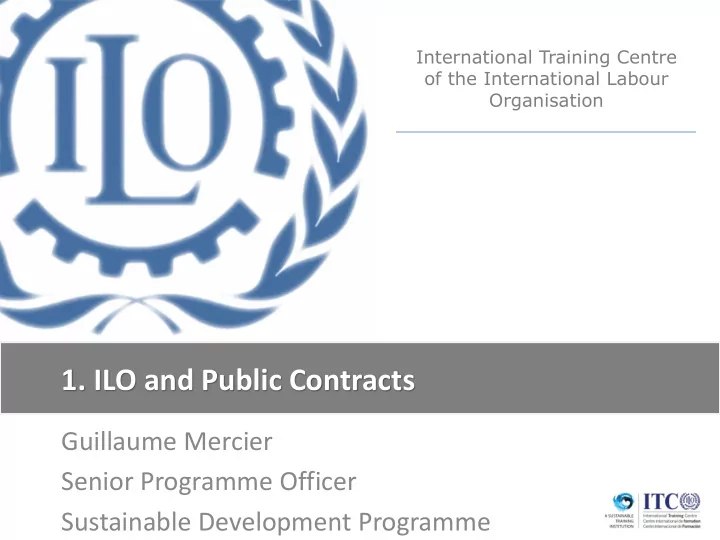

International Training Centre of the International Labour Organisation 1. ILO and Public Contracts Guillaume Mercier Senior Programme Officer Sustainable Development Programme
International Labour Organisation (ILO) • The only tripartite U.N. agency, since 1919 the ILO brings together governments , employers and workers representatives of 187 member States, to set labour standards , develop policies and devise programmes promoting decent work for all women Public sector and men. actors Governments Private Civil Business sector Workers Society Organisations Organisations
ILO and Public Procurement: Convention on Labour Clauses in Public Contracts The concern stems from the fact that government contracts are usually awarded to the lowest bidder and that contractors may be tempted , in view of the competition involved, to economize on labour costs . In such contexts, it is generally recognized that governments should not be seen as entering into contracts involving the employment of workers under conditions below a certain level of social protection, but, on the contrary, as setting an example by acting as model employers .
4
New Interest by Member States, 2008 report • the increasing importance of s ubcontracting , global sourcing and the complexities of supply chain management • the increasing availability and use of contractors that perform the work under the contract outside the borders of the country for which the work is being performed; • there significant growing international movement to apply labour standards to public contracting as well as to private contracting in public – private partnerships .
Sustainable Public Procurement : the government a model employer Green jobs Corporate social responsibilities Enterprises development Labour inspection Global Supply Chain Employment generation and Occupational Safety and skills development and Health
International Training Centre of the International Labour Organisation 2. CAPACITY DEVELOPMENT Enhancing Anti-Fraud and Corruption Measures in Public Sector in Developing Countries 7
FRAUD AND CORRUPTION A COMPLEX SOCIAL ISSUE • According to yesterday (you) and in one slide, to fight corruption you need – a system (a balanced system, especially between the need for efficiency and for control) – a coalition of people or a comprehensive approach, it cannot be dealt with one actor only, it cannot be won alone. – to engage with the civil society organisations and the medias who are the primary watchdogs – to enhance transparency, particularly by using advanced technologies – to implement actions to prevent, detect and sanction – to establish trust between actors in the system (protection, confidentiality, etc.), so the system functions and whistle blowers activate – you need whistle blowers – you need to demonstrate results to maintain the established trust and the whistle blowers – devoted public servants who put the general interest first and who are qualified in diverse fields (multidisciplinary and highly-specialized expertise is needed) – an appropriate budget, equipment and number of staff – to know the tricks of the cheaters in the procurement process (preparation of corruption) as well as their tricks in contract execution phase (implementation of corruption) – You need to evolve as quick as the tricks evolve – archives and accessible documents – access to an International network / coalition: corruption is globalised – to be also aware that corruption is invisible
SYSTEMIC APPROACHES TO ADDRESS SOCIAL COMPLEX ISSUES IN DEVELOPMENT (ECO-SYSTEM) The meta-level where the mind frames of the people making up the social system (their values, norms, perceptions and communication codes) are shaped The macro- level where the ‘rules of doing business’ (policies, laws, regulations, guidelines, etc.) for system stakeholders are codified and enforced The micro-level where people physically interact in the world of work. Individuals’ knowledge, skills and attitude.
GREENING THE CONSTRUCTION SECTOR IN ZAMBIA Facilitating change, facilitating relationships Actor network analysis of the building construction sector in Zambia
Capacity Development Institutions Individuals Rules and regulations, Skills, knowledge and attitude operations, controls, checks and (micro-level) balances, etc. (macro-level) Corruption Issues Enabling environment Public trust, public interest, culture, behaviour, social norms, etc. (meta-level)
Recommend
More recommend